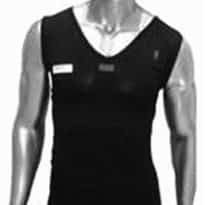A ‘smart t-shirt’ that acts as a remote monitoring system for the chronically ill is to be trialled in the UK.
The system, which has been developed through the Chronious project in Europe, is designed specifically for chronic obstructive pulmonary disease and chronic kidney disease patients.
A light-weight t-shirt is fitted with heart, respiratory and activity monitoring sensors, that work alongside external devices such as a digital weight scale, glucometer, blood pressure monitor, spirometer and air quality sensors used in the patient’s home.
All the devices are connected to a mobile device, such as a smartphone, which transmits the patient’s data to their care provider, where it can be analysed with “intelligent data processing software.”
Robert Rosso, research and development manager at telehealth provider TESAN in Italy, who leads the project, said that the system would help treat diseases that require patients to regularly visit their doctor.
“For doctors one of the big advantages of this approach is that the data is highly accurate. Patients are being monitored every day as they live their normal lives so a better picture of their symptoms and progress can be used to determine treatments.
“For example, eating correctly is crucial for reducing CKD symptoms, but current practice relies on patients filling in questionnaires about what they eat when they go for a check-up and the information they provide may not be entirely accurate,” he said.
The Chronious project, which is supported by €7.25m funding from the European Commission, aims to combat chronic health problems with smart solutions, and has already tested the t-shirt system in two trials in Spain and Italy.
The data, which is processed and analysed, ensures treatments can be fine-tuned to a patient’s individual requirements.
The project believes the system will reduce the need for regular check-ups while alerting clinicians to an immediate change in a patient’s vital signs, potentially saving lives.
A follow-up project called Chromed, which will involve more extensive trials of the product, is now to take place in the UK, Spain, Estonia, Slovenia and Sweden after Chronious received additional funding from the EU.
“The trials in Chronious were very successful and the user feedback was useful in refining the system and user interfaces. Chromed will extend this work and we will focus the system specifically on monitoring patients with comorbidity. The trials will provide objective data on the benefits of the system,” Rosso added.
Rosso also said that Tesan is considering developing a commercial service for monitoring chronically ill patients based on the Chronious project results, while project partners such as Velti and Uniscan may look to commercialise some of the underlying technological components of the system.

